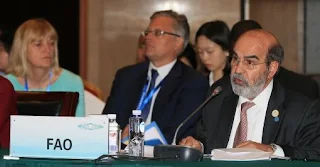The Chief
Executive Officer of the Africa Media Initiative (AMI), Mr. Eric Chinje, has
adduced some reasons behind the recently concluded assemblage of some 50 media
practitioners in Yamoussoukro, Cote d’Ivoire, to leverage skills on covering
agriculture, reports NaijaAgroNet.
Chinje
who made this known at the three-day session wrap-up, informed NaijaAgroNet
that the aim was to develop a critical mass of skilled reporters who are specialized in
covering the agriculture sector, and belong to a professional network and
continental community of practice.
On working with the World Bank, he said,
AMI commenced this project in West Africa where a three-day training workshop
was held in Yamoussoukro, between June 13 and 16, 2016, because they believe
that well-informed, incorporating evidence-based knowledge and data could be
used in broader development policy-making in areas such as poverty reduction, employment
and labour policies, and overall economic policy.
He also outlined the objectives to
comprise sensitizing participants to the importance of agriculture issues in
their country and region; building participants’ capacity to gather and analyze
agriculture data and render reports on agriculture that are “palatable and
digestible by all levels of media consumers.”
Additionally, Chinje said, the workshop
enriched national and regional dialogues on agricultural policies; animate an
online network platform with their reports and documentaries, thus, allowing
for well-researched and informed articles and audio-visual products to be
widely disseminated beyond their own media organizations.
“About 50 journalists are expected to
attend this training, that is, 40 from West Africa and 10 from the other
regions, namely North, Central, East, Southern and the Indian Ocean Islands,”
he said, stressing, that all the participants showed enthusiasm in agriculture.
Agriculture, he said, is a critical
component of development in Africa, with a growing consensus that could
directly affect state welfare and individual well-being, therefore, media coverage
of the sector is important.
... Linking agrobiz, sustainable environs, people & technology
Pix: Chief Executive Officer of the Africa Media Initiative (AMI), Mr. Eric Chinje









